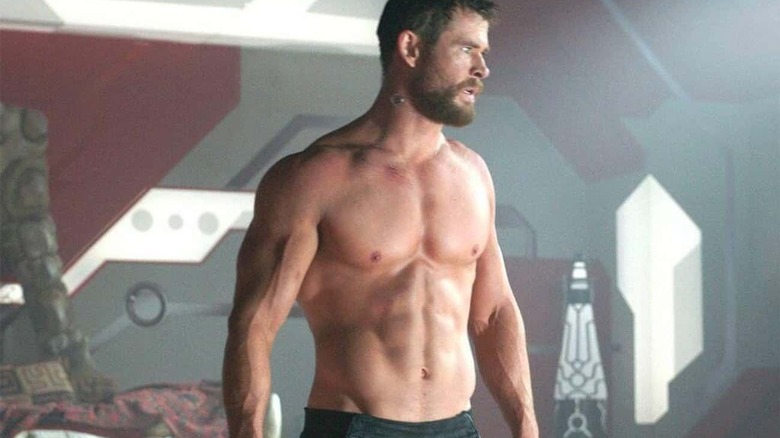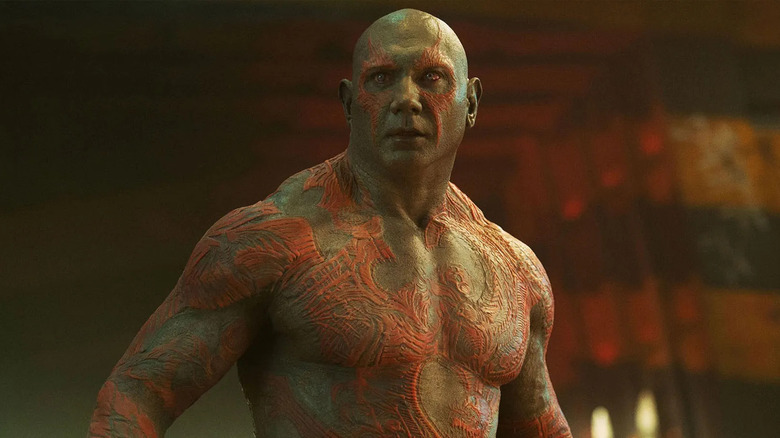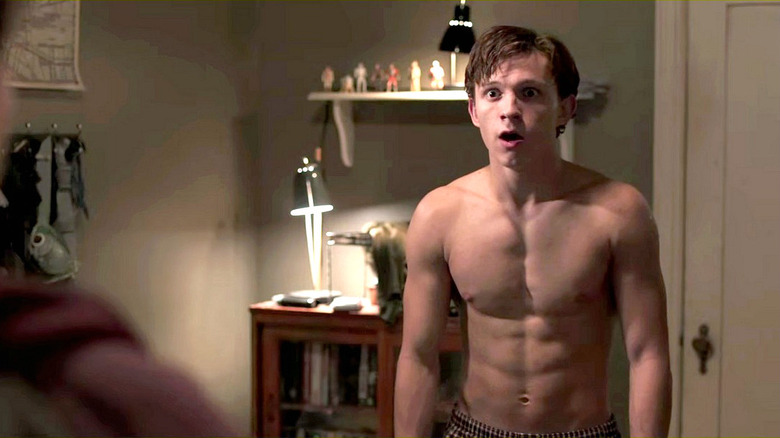Marvel Molds Normal Actors Into Superhero Shape Using One Controversial Resource
Several notable actors from the Marvel Cinematic Universe have talked to fitness and health magazines about their workout regimens. Karen Gillan had to do a lot of lifting and fight training to play Nebula. Dave Bautista, who plays Drax the Destroyer, noted that "superhero fit" is rather different from "wrestler fit." Want to get fit like Chris Evans when he plays Captain America? Men's Health Magazine has a whole routine devoted to his body.
Comic book superheroes, since the birth of the medium, have typically represented idealized human physiques, usually fetishizing large muscles and athletic frames. Men typically all have broad shoulders and washboard abs, while women are all lithe and busty, infamously contorting their near-nude bodies in unusual ways. It's easy to see why the trend persists: young comic book fans likely enjoy projecting themselves into the most widely celebrated body types, while also ogling attractive imaginary people. Is the fetishization of the superhero physique healthy for the mind of a young reader? Perhaps not. It's certainly dubiously healthy for real-world actors who have to starve themselves and lift weights incessantly to ensure their bodies match their on-page counterparts. Famously, Kumail Nanjiani worked himself into "shredded" territory upon being cast in the MCU film "Eternals." Perhaps unfairly, Nanjiani wasn't featured in a shirtless scene in said film.
In the new book "MCU: The Reign of Marvel Studios," written by Joanna Robinson, Dave Gonzales, and Gavin Edwards, it seems that achieving a superhero bod incorporated more than months of working out, training, and very specialized, protein-only diets. To "hurry things along," as it were, several actors may have taken steroids. This was the assumption of health expert Dr. Todd Schroeder, interviewed for the book.
Fifty to seventy-five percent of MCU actors do it
Dr. Schroeder's full title is associate professor of clinical physical therapy and director of the University of Southern California Clinical Exercise Research Center at the USC Division of Biokinesiology and Physical Therapy. He posited that many of the MCU actors take steroids or other forms of performance-enhancing drugs (PEDs) "At least for the short term. [...] I would say that fifty to seventy-five percent do." Dr. Schroeder doesn't note his criteria for coming up with that figure, although it's likely he can tell just by looking at certain bodies; he would know what muscles come from working out, and which have been artificially inflated.
"MCU" also cites a 2013 study done by the Hollywood Reporter that noted many A-list actors use drugs to define their musculature. One interviewed trainer figured about 30% of actors use steroids. It was more common among older actors who wanted gym-ready bodies in a matter of months. Schroeder was also quoted in that study, and he said that the "shortcut" of PEDs was too alluring to pass up. "If someone says, 'Hey, add [PEDs] to this workout,' you can get substantial changes very quickly." THR noted that steroid use is a pretty open secret in showbiz circles and that many, many actors expected to play muscley "hero" roles take PEDs regularly.
It's worth noting that some steroids are legal with a prescription, and that actors tend to work with trainers, dieticians, and other health experts to ensure that they're keeping healthy as well as fit. It's also worth noting that many PEDs, when taken in a controlled fashion and in short-term bursts, don't do any lasting damage to the body.
'It's kind of expected'
Dr. Schroeder said:
"Nowadays, it's kind of expected and, working under a doctor's care, it's really been accepted. A lot of actors won't talk about it openly, but they will work with a physician as well as a nutritionist and a trainer, and it's a team. It's not smart for an actor to do that alone. The big thing is, you can take steroids, testosterone, different androgens, growth hormone for a short period of time without any lasting effects on the body. It's not like you become addicted to it."
With words like that, it might seem wholly safe, easy, and acceptable for actors to bulk up with needles as well as weights. For an actor in their 20s who only needs to be utterly ripped for a few weeks of shooting, it seems that these expensive chemical shortcuts are fine to do every once in a while.
Just don't make a habit of it. Dr. Schroeder noted that some actors, when they gain a reputation for being cut and fit, may start to wrestle with body image issues. Do they try to stay fit when they're not shooting a superhero movie? And how will they feel when they learn that natural strength training doesn't produce the same photogenic physique that steroids did? This becomes even more fraught with the MCU, when actors are expected to return to the same role, year in and year out, for seven or eight movies. "[M]aintaining that," Dr. Schroeder said, "is challenging." He noted, "It's a tough, tough world out there. What people expect of you, and how you need to look, and trying to maintain that."
Robert Downey, Jr. was 43 when he first played Iron Man and 56 when he stopped. How long did the actor feel he needed to be shredded?
Bulking up, slimming down, bulking up
Like all major bodily transformations that actors go through, it's the rapid changes that can do the most damage to their health. One might have heard about how certain actors chug ice cream to gain weight for certain roles or starve themselves for others. The same goes for actors who want to be muscular and bulky for an MCU role, but then play a character with an average physique in their next project.
Trainer Aaron Williamson — who worked with actors on multiple high-profile Hollywood blockbusters — was interviewed for "MCU," and he noted that the physical whiplash is dangerous. Williamson said:
"Actors are trying to get on camera and blow everyone away [...] Everyone's just maxed out, doing everything possible to look superhuman ... Someone might do a film where they have to look like a 'normal' person and then for their next project, they've got to look like this bulked-up, crazy-looking superhero guy. It's impossible to go from one extreme to the other overnight without some type of help."
Schroeder wasn't judgmental about PED use for MCU actors, however. He knew that superhero roles were desirable as they attracted a lot of public attention and tended to pay well. They were also long-running gigs. If an actor wanted to, with a doctor's supervision, use certain PEDs in the short-term in order to secure a gig that pays millions, then it was perfectly acceptable.
Schroeder also noted that some of the MCU actors were merely predisposed to good muscle tone (the lucky jerks). He noted that Chris Hemsworth was most of the way to Thor before signing on to play the role and that a small amount of working out bulks him up plenty. Hemsworth, he said, takes no PEDs.



